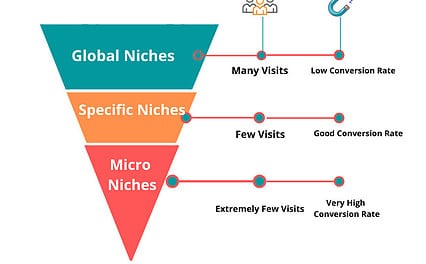We all get into affiliate marketing hoping to achieve at least some level of success. You want to make sales and earn a commission for example. We all do. But what exactly determines the amount of success you achieve as an affiliate?
According to Supermetrics, affiliate marketing success is determined by a number of factors that include, among others;
- Doing what you love (passion)
- Finding the right niche
- Choice of affiliate program/Network
- Continous learning
- Persitenance
Perhaps the choice of niche is the glue that bind the others for reasons we shall see later in this post.
What is a Niche in Affiliate Markeitng?
Simply put, a niche is a specialized segment of a market. In affiliate marketing, it represents a distinct and specialized area of interest that appeals to a particular group of people with shared characteristics, needs, or preferences. Affiliates often choose a niche to focus their marketing efforts on because it allows them to target a specific audience and tailor their promotional strategies more effectively.
 Here is an example. If you want to make money online through a blog in finance, the topic is too broad. There are sub-topics such as investment, personal finance, credit cards, cryptocurrency etc. Each of these sub-topics have micro topics. A reader interested in debt management will find your finance blog too broad, more of fishing expendition. However a debt blog will be more appropriate for such a reader.
Here is an example. If you want to make money online through a blog in finance, the topic is too broad. There are sub-topics such as investment, personal finance, credit cards, cryptocurrency etc. Each of these sub-topics have micro topics. A reader interested in debt management will find your finance blog too broad, more of fishing expendition. However a debt blog will be more appropriate for such a reader.
Examples of niches in affiliate marketing include:
- Fashion and Beauty – Fashion, cosmetics, skincare, and personal grooming are evergreen niches. Sub-niches may include sustainable fashion, niche fashion styles, or specific beauty products.
- E-learning – Online courses, tutoring services, and educational resources.
- Sustainable Living – Niches related to eco-friendly products, renewable energy, and sustainable living are gaining traction.
Why is a Niche Important to Affiliates?
Choosing the right niche is crucial in affiliate marketing because it helps affiliates focus their efforts, build authority in their chosen area, and attract a specific and engaged audience. A well-chosen niche can lead to higher conversion rates and more profitable affiliate marketing campaigns. It’s essential to balance the niche’s potential for profitability with your own interests and expertise to ensure long-term success in affiliate marketing.
The choice of a niche is important because of the following reasons;

- Targeted Audience – A niche allows affiliates to focus on a specific, well-defined audience with shared interests, needs, and preferences. When you cater to a niche, you can create content and promotions that are highly relevant to this audience, increasing the likelihood of engagement and conversions.
- Reduced Competition – In broader markets, competition among affiliates can become very stiff. However, when you are blogging within a niche, you often face less competition. This makes it easier to establish yourself as an authority and gain the trust of your audience.
- Building Authority – When you consistently provide valuable content and promote relevant products within a niche, you can become an authority in that space. People are more likely to trust and follow recommendations from experts in a specific field. Your domain authority (DA) continue to raise. Check the authority of your domain here.
- Higher Conversion Rates – Targeted marketing to a niche audience often leads to higher conversion rates. This is because the audience is more likely to be genuinely interested in the products or services you promote, resulting in more qualified leads and sales.
- Easier Content Creation – Focusing on a niche simplifies content creation. You can generate content ideas more easily when you have a specific audience and topic to center your content around. This streamlines your content marketing efforts.
- Effective Marketing Strategies – Niche marketing allows affiliates to tailor their marketing strategies to the unique needs and preferences of their audience. This can lead to more effective marketing campaigns and better results.
- Long-Term Sustainability – Building a niche affiliate site or brand can be more sustainable in the long run. It’s often easier to maintain and grow an audience within a niche compared to a generic, broad market where trends and interests may change rapidly.
- Monetization Opportunities – In a niche, you can explore various monetization methods beyond affiliate marketing, such as selling your products, offering consulting or coaching services, or attracting sponsorships and partnerships.
- Passion and Expertise – Many successful affiliates choose niches that align with their interests and expertise. This not only makes the work more enjoyable but also enables them to create more authentic and valuable content.
- Diversification Possibilities – Once you’ve established yourself in one niche, you can explore related niches or sub-niches to diversify your income streams and expand your affiliate marketing efforts.
Having the right niche is therefore a strategic approach by affiliates to a more successful and sustainable affiliate marketing efforts.
Beginners’ Guide to Choosing a Niche for Affiliate Marketing.
Choosing a niche for your blogging venture is a critical decision as it can significantly impact the success of your blog. Here are some steps to help you choose a niche for blogging:
- Identify Your Interests and Passions – Start by making a list of topics that genuinely interest you and about which you’re passionate. Blogging about something you love will keep you motivated and engaged over the long term.
- Assess Your Expertise – Consider your knowledge and expertise in various areas. A niche where you have some level of expertise can make it easier to create valuable content and establish credibility.
- Market Research – Research potential niches to understand their market demand. Use tools like Google Trends, Google Keyword Planner, and niche-specific forums or communities to gauge interest and trends.
- Competitive Analysis – Check out other blogs in your potential niches. Analyze their content, audience engagement, and monetization strategies. Assess the competition to see if there’s room for your blog to stand out.Use of Keyword Research Tools such as Google Analytics, Jaaxy, Ahrefs, will come in handy for this exercise.
- Narrow Down Your Options – Based on your interests, expertise, market research, and competition analysis, narrow down your list to a few potential niches. It’s often best to start with one niche and expand later if desired.
- Audience Research – Consider the target audience for each niche. Who are they? What are their needs, problems, and preferences? Choose a niche where you can connect with and provide value to this audience.

Choosing a Successful Niche: Source Semrush.com - Monetization Potential – Evaluate the monetization possibilities within each niche. Will you be able to earn income through affiliate marketing, sponsored content, advertising, digital products, or other means? Choose a niche with strong monetization potential.
- Long-Term Viability – Think about the long-term viability of your chosen niche. Avoid niches that may be too seasonal or trendy, as they can be challenging to sustain over time.
- Passion vs. Profit – Strike a balance between your passion and profit potential. While it’s essential to love your niche, you also want it to be financially viable.
Choosing a Niche: Other Pertinent Considerations
- Domain Availability – Check if domain names related to your chosen niche are available. A memorable and relevant domain name can help with branding and search engine optimization (SEO).
- Test and Validate – Before committing fully, create a few pieces of content in your chosen niche and see how they perform. Are you enjoying the process? Is there engagement from your audience? Are you seeing signs of growth?
- Plan Your Content Strategy – Once you’ve chosen a niche, outline your content strategy. Decide on the types of content you’ll create, how often you’ll publish, and how you’ll promote your blog.
- Choice of Affiliate Program/Network – Choosing the right affiliate program is a crucial step in your affiliate marketing journey. The affiliate program you select can significantly impact your ability to earn commissions and succeed in your chosen niche. For example, consider an affiliate program that has a free subscription, training and support platforms for beginners.
- Stay Open to Adaptation – Keep in mind that your niche choice is not set in stone. As you gain experience and learn more about your audience, you may decide to pivot, expand, or refine your niche over time.
Choosing a niche for your blog is a significant decision, so take your time to research and make an informed choice. A well-chosen niche that aligns with your interests, expertise, and the needs of your target audience can set you on the path to blogging success.
Best Blogging Niches in 2023
To build a money-making blog and avoid wasting your time and effort – you must choose a profitable niche.
The best affiliate niches in 2023 can vary depending on trends, market demand, and consumer behaviours. It’s essential to choose a niche that aligns with your interests, expertise, and the needs of your target audience. While there is no one-size-fits-all answer, here are some affiliate niches that are likely to be popular and potentially profitable in 2023:
- Health and Wellness – This perennially popular niche includes sub-niches like fitness, weight loss, mental health, nutrition, and wellness products. With increasing awareness of health issues and the importance of well-being, this niche continues to thrive.
- Technology – As technology continues to advance, there are numerous opportunities in niches like smartphones, consumer electronics, software, and home automation. Stay updated on the latest tech trends to be competitive.
- Finance and Investment – The finance niche, including sub-niches like personal finance, investing, credit cards, and cryptocurrency, remains evergreen. People are always looking for ways to manage their money and investments effectively.
- Travel – Travel affiliate programs offer opportunities in various sub-niches such as budget travel, luxury travel, adventure travel, and eco-tourism. The travel industry is expected to rebound post-pandemic.
- Home and Garden – With people spending more time at home, there’s an increased interest in home improvement, gardening, and interior design. These niches can encompass products ranging from furniture to smart home devices.
- Food and Cooking – Food-related affiliate niches, such as cooking equipment, specialty diets (e.g., vegan, keto), and gourmet foods, can be profitable, especially with the increasing popularity of cooking at home.
- Parenting and Family – Products and services related to parenting, childcare, education, and family-oriented activities are consistently in demand.
- Pet Care – The pet industry is booming, and niches related to pet care, pet products, and pet services continue to offer opportunities for affiliates.
Bear in mind that many of these niches are in a category Google refer to as YMYL (Your Money or Your Life). This type of content demands Experience, Expertise, Authority and Trust (EEAT).
Summary
As Semrush Blog put it, a niche is the main subject of all the content on your blog.
It is always important ot bear in mind that success in affiliate marketing depends not only on the niche but also on your ability to create valuable content, drive traffic, and engage your audience. Conduct thorough research, understand your target audience, and stay up-to-date with industry trends to make informed decisions about the affiliate niches you want to pursue in 2023.
Niche selection does not exist in vacuum. You must also invest in other areas such as effective SEO, content marketing, Links building and keyword research to maximize your affiliate earnings.
Jeff
Safariaffiliate
